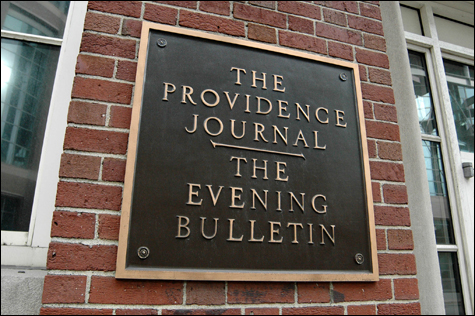
CHANGED INSTITUTION: A reminder of bygone days in Rhode Island. |
Eight years ago, when staffers for the Democrat challenging then-Republican US Senator Lincoln Chafee groused about a supposed pro-Chafee bias within the pages of the Providence Journal, executive editor Joel P. Rawson cited the ProJo’s own reporters as the best safeguard against slanted coverage. “They’re too contrary, too independent, and too fiercely competitive,” he told me at the time.
Rawson could have just as easily been talking about himself. Although he’s hardly a household name, no one has been more influential over the past three half-and-a-half decades in shaping the identity of Rhode Island’s statewide daily.
Earlier this week, Rawson, 64, told colleagues that he will be retiring, effective April 29. Considering how his career at the ProJo bridges two distinctly different eras in journalism, it would be remarkable if there aren’t some bittersweet feelings when he makes that last walk out the door of the Journal Building.
In the ’70s, when American newspapers were elevated by the Watergate-related heroics of Woodward and Bernstein, Rawson helped to reinvent the Providence Journal-Bulletin as a swaggering entity that exposed corruption and used innovative storytelling techniques to captivate readers. The paper grew in national stature, with a steady stream of its reporters moving on to the Wall Street Journal, Boston Globe, and other larger employers.
In 1997, the Dallas-based Belo Corporation, attracted mostly by the chance to acquire the Journal Company’s more lucrative string of television stations, bought the ProJo, and a predictable series of cutbacks, including buyouts that winnowed the once-generously sized staff, continued. Over time, as it became clear that the running down of a medium-sized journalistic jewel was part of a broader upheaval in the newspaper industry, Rawson remained a forceful advocate.
“I think he cared about the newsroom in a way that not many people have,” says metro columnist Bob Kerr, who credits Rawson with handing him his assignment 14 years ago. “And I think he protected it for a long time during the decline, during the decline of the paper.” Kerr says it’s his sense that, as autonomy of the newsroom gradually eroded, “I think he tried to keep us able to do what we do without too many outside influences. I think that’s how many people will remember him.”
While Rawson would have been required to retire when he turns 65 next March, one reporter, who requested anonymity, says staffers were nonetheless surprised by the news of his impending departure, since “he has been so much a part of the paper for so many years.”
(In keeping with Journal management’s general practice of not speaking with the Phoenix, Rawson, publisher Howard Sutton, and new media czar Tom Heslin — a possible successor for Rawson — did not return calls seeking comment.)
A Vietnam veteran, pilot, and unpublished novelist, Rawson, particularly in earlier days, was known for sometimes standing on his desk to make his point, an old-school guy who could be tough, very tough. Even in the run-up to retirement, he has retained the inclination to get fired-up about a big story.
Rawson is the sole survivor among the trio — including then-publisher Michael Metcalf (who was killed during a mysterious 1987 bicycle accident), and Charles McCorkle Hauser (who died in 2005) — that engineered the Journal-Bulletin’s rise during the increasingly distant ’70s. More recently, notes Kerr, in a time of diminished resources, “he made the best of what is not a good situation. God knows where we go from here.”